David Fincher: A Retrospective
"Who couldn't use some more David Fincher in their lives?"
Entertainment Fuse is excited for the impending release of David Fincher's
Gone Girl...like really excited. Earlier this week, Mitchel Broussard
introduced us to, and prepared us for, the upcoming film that is sure to be a chilling thrill ride. It is my aim to cover the previous works of David Fincher, and to more fully explore his oeuvre.
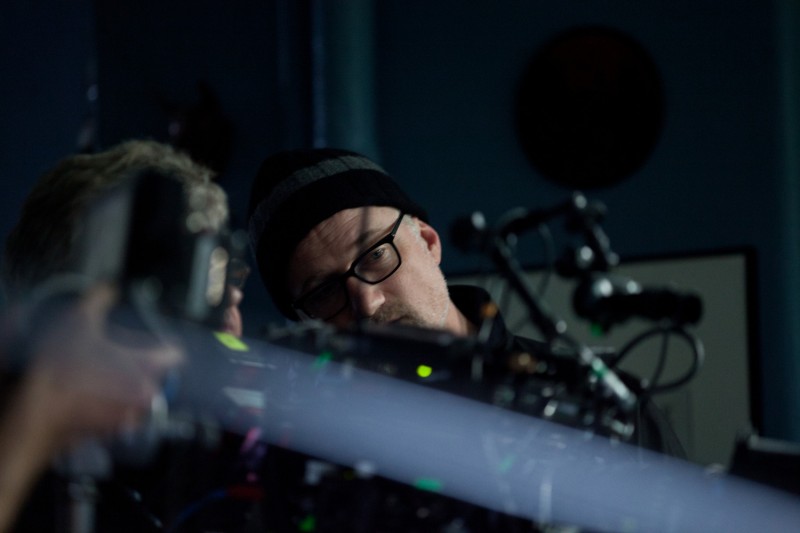
Fincher got his start directing music videos, documentaries and commercials. His foray into feature films came with 1992's
Alien³. The third (hence the 3) in the immensely popular
Alien franchise, it won an Oscar for visual effects, but flopped with critics and audiences alike. Losing money at the box office, and turning audiences off a popular franchise, Fincher derided the film, saying, “no one hated the film more than me.” Shying away from feature films for three years, Fincher burst back onto the cinema scene with
Se7en. Starting to develop his visceral and gritty cinematic style, Fincher's
Se7en was a breakout hit, earning acclaim from audiences and critics. Featuring Brad Pitt as a freshman detective under the tutelage of veteran officer Morgan Freeman, Fincher took the serial killer genre to the next level. Menacing cuts and sharp editing coupled with the harsh environment of the city (it never seems to stop raining) keep the tension at almost unbearable levels. Listed as one of Roger Ebert's “Great Movies”
Se7en inspired a generation of film lovers, and put Fincher back on the map.
Fincher's follow up to
Se7en was the equally twisted (in terms of actual plot twists)
The Game. Starring Michael Douglas as reclusive billionaire Nicholas Van Orton,
The Game is a journey through his nightmare as he gets strung-along by a very elaborate series of events. Revealing dark areas of his past, and forcing him to confront his demons, Van Orton's adversaries are every bit as meticulous as the killer in
Se7en. Featuring a maze-like plot with a totally unexpected outcome,
The Game is an attention-grabbing thrill ride, the likes of which only Fincher can provide.
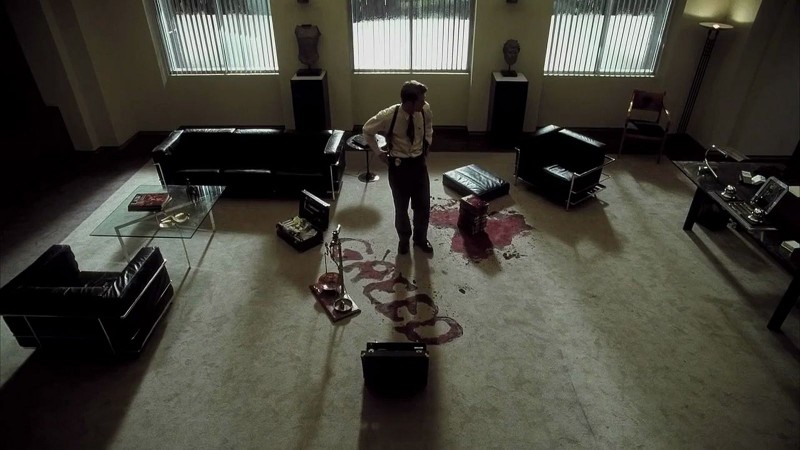
Fincher's most famous film followed, which is, of course, the cult smash-hit
Fight Club. Based on the novel by Chuck Palahniuk,
Fight Club combines Fincher's signature style, with a new element of computer-enhanced cinematography. With mind-bending hallucinatory visuals, and dark nihilistic undertones,
Fight Club is a gripping look into the psyche of a deranged insurance salesman. Powerful performances by Edward Norton and Brad Pitt help shape the narrative as
Fight Club follows the two as they start an underground boxing club for men. As the group expands, Pitt's Tyler Durden begins to stray from boxing into anarchist terrorist plots to disrupt society. Preaching a healthy dose of anti-consumerism, Durden begins to recruit an army of disenfranchised men trying to find a place for themselves in society. Going so far as to make its audience second guess their own relationship to society and consumerism, Durden (by way of Fincher) is a powerful on-screen presence whose intensity is only matched by his desire to tear down society. Using heavy narration (Norton's character remains nameless), Fincher's film is full of quirks (Starbucks cups in every frame), and hidden messages – and on multiple occasions reminding the audience that it is a film (edges of the “film” showing, and reel markers in the corners). Wrought with symbolism and profound meaning, Fincher's
Fight Club demands multiple viewings, and deep exploration.
Fincher followed up
Fight Club with the much less beloved
Panic Room. While still visually appealing,
Panic Room had too high a bar set by its predecessor. Staying fixed on Jodie Foster while she and her daughter, Kristen Stewart in one of her earliest roles, are trapped within the confines of a panic room inside their home,
Panic Room was a claustrophobic thriller with the dark and mysterious tones Fincher is best known for.
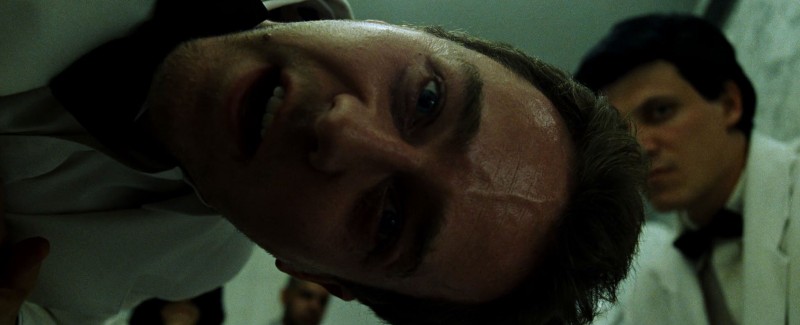 Zodiac
Zodiac is Fincher's masterful epic that spans a decade and a half of material in just under 160 minutes. Covering the sprawling investigation of the Zodiac killer who went on a murder spree in San Francisco in the late 60's and early 70's,
Zodiac features Fincher's signature direction mixed with the primal fear associated with its basis in reality. With various magnificent panning and sweeping shots, Fincher creates a tense and beautiful cinematic landscape. Expanding on all of the various aspects of his direction leading up to it, Fincher puts all of his skills to work in
Zodiac. Although it is based on Robert Graysmith's novel of the same name, Fincher uses close-ups and quick side-by-side cuts to build an unbearable amount of tension. Focused on both the slowly-fraying demeanor of its characters, and the immense hazy landscape of the Bay Area, Fincher keeps his audience uneasy – never offering enough to divulge the plot's next step, nor hinting at possible resolution. Surely one of his finest films,
Zodiac has secured Fincher's spot among the world's foremost directors.
Stepping away from darkness, and into a more light-hearted and surreal genre, Fincher's
The Curious Case of Benjamin Button is a beautiful story about life, love and finding happiness. Brad Pitt returns in a role masked by CGI for its entire first-half. Pitt plays Benjamin Button, a man born with a “rare” genetic disorder wherein he is born into the body of an old man, and ages backwards. Becoming younger and more virile every year, Button is followed throughout his life; detailing his many interesting stories and accomplishments. Told by proxy through the reading of his personal diary,
Benjamin Button utilizes a similar narrative structure to that of
Fight Club, albeit in a much lighter vein. Sweeping beautifully across decades of time, and vast parts of the globe,
The Curious Case of Benjamin Button earned Fincher an Oscar nomination for his direction.
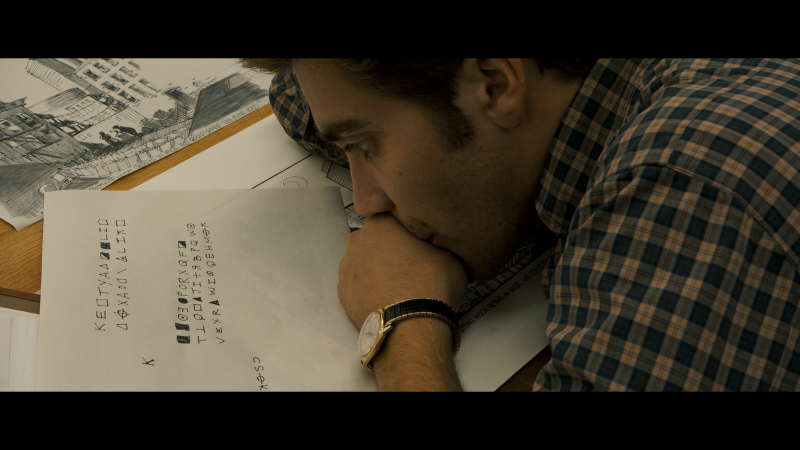
I would be lying if I said I was excited when I heard the news that Fincher was following up
Benjamin Button with the Facebook-based
The Social Network. I will be the first to admit how wrong I was. Following the collegiate years of Mark Zuckerberg, and his early development of social media website, Facebook,
The Social Network features a crisp screenplay written by Aaron Sorkin, and a haunting soundtrack by Atticus Ross and Trent Reznor. A cold and quick-witted performance by Jesse Eisenberg (as Zukerberg) leads a formidable cast of young actors, each vying for a piece of the billionaire lifestyle. Slow and methodical,
The Social Network takes a vanilla, pop-culture subject and transforms it into a deep and brooding exposé on greed and friendship.
Fincher's latest project is a remake of the Swedish film (by way of the Swedish book),
The Girl With the Dragon Tattoo. Similar in scale to
Se7en with the suspenseful who-done-it feel of
Zodiac, Fincher brings his style to a worthy remake. Henrik Vanger's, a wealthy business magnate, niece was murdered in the 60's, and he has been receiving tokens from her killer ever since. Enlisting the help of recently-shamed journalist, Mikael Blomkvist (Daniel Craig), Vanger is determined to find the killer. Embarking on an investigation that is 40 years old, Blomkvist begins to discover a pattern of violence spanning years before and after her killing. With wonderful performances by Rooney Mara (as Lisbeth Salander, Blomkvist's assistant) and Daniel Craig, Fincher is able to provide the mystery and tension that his audience has come to expect. Filmed in the harsh coldness of northern Sweden, Fincher's dull and lifeless color palate adds to the story's bleak demeanor. With another score by Reznor and Ross, Fincher's film is a slow burn, complete with placid tones, lulling its audience into an unwitting ease.
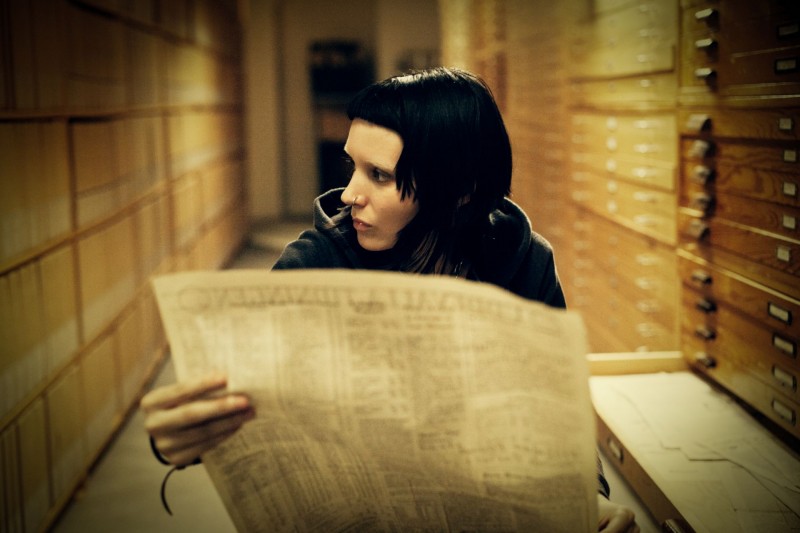
David Fincher is slowly becoming the master of smoldering thrillers, each more dark than the last. His eye for detail and his technical ability behind the camera aid in his storytelling, and add to the overall mood of his films. David Fincher is able to draw his audience to the edge of their seats; holding them there mercilessly, and refusing to release until his story has been told.
 Fincher got his start directing music videos, documentaries and commercials. His foray into feature films came with 1992's Alien³. The third (hence the 3) in the immensely popular Alien franchise, it won an Oscar for visual effects, but flopped with critics and audiences alike. Losing money at the box office, and turning audiences off a popular franchise, Fincher derided the film, saying, “no one hated the film more than me.” Shying away from feature films for three years, Fincher burst back onto the cinema scene with Se7en. Starting to develop his visceral and gritty cinematic style, Fincher's Se7en was a breakout hit, earning acclaim from audiences and critics. Featuring Brad Pitt as a freshman detective under the tutelage of veteran officer Morgan Freeman, Fincher took the serial killer genre to the next level. Menacing cuts and sharp editing coupled with the harsh environment of the city (it never seems to stop raining) keep the tension at almost unbearable levels. Listed as one of Roger Ebert's “Great Movies” Se7en inspired a generation of film lovers, and put Fincher back on the map.
Fincher's follow up to Se7en was the equally twisted (in terms of actual plot twists) The Game. Starring Michael Douglas as reclusive billionaire Nicholas Van Orton, The Game is a journey through his nightmare as he gets strung-along by a very elaborate series of events. Revealing dark areas of his past, and forcing him to confront his demons, Van Orton's adversaries are every bit as meticulous as the killer in Se7en. Featuring a maze-like plot with a totally unexpected outcome, The Game is an attention-grabbing thrill ride, the likes of which only Fincher can provide.
Fincher got his start directing music videos, documentaries and commercials. His foray into feature films came with 1992's Alien³. The third (hence the 3) in the immensely popular Alien franchise, it won an Oscar for visual effects, but flopped with critics and audiences alike. Losing money at the box office, and turning audiences off a popular franchise, Fincher derided the film, saying, “no one hated the film more than me.” Shying away from feature films for three years, Fincher burst back onto the cinema scene with Se7en. Starting to develop his visceral and gritty cinematic style, Fincher's Se7en was a breakout hit, earning acclaim from audiences and critics. Featuring Brad Pitt as a freshman detective under the tutelage of veteran officer Morgan Freeman, Fincher took the serial killer genre to the next level. Menacing cuts and sharp editing coupled with the harsh environment of the city (it never seems to stop raining) keep the tension at almost unbearable levels. Listed as one of Roger Ebert's “Great Movies” Se7en inspired a generation of film lovers, and put Fincher back on the map.
Fincher's follow up to Se7en was the equally twisted (in terms of actual plot twists) The Game. Starring Michael Douglas as reclusive billionaire Nicholas Van Orton, The Game is a journey through his nightmare as he gets strung-along by a very elaborate series of events. Revealing dark areas of his past, and forcing him to confront his demons, Van Orton's adversaries are every bit as meticulous as the killer in Se7en. Featuring a maze-like plot with a totally unexpected outcome, The Game is an attention-grabbing thrill ride, the likes of which only Fincher can provide.
 Fincher's most famous film followed, which is, of course, the cult smash-hit Fight Club. Based on the novel by Chuck Palahniuk, Fight Club combines Fincher's signature style, with a new element of computer-enhanced cinematography. With mind-bending hallucinatory visuals, and dark nihilistic undertones, Fight Club is a gripping look into the psyche of a deranged insurance salesman. Powerful performances by Edward Norton and Brad Pitt help shape the narrative as Fight Club follows the two as they start an underground boxing club for men. As the group expands, Pitt's Tyler Durden begins to stray from boxing into anarchist terrorist plots to disrupt society. Preaching a healthy dose of anti-consumerism, Durden begins to recruit an army of disenfranchised men trying to find a place for themselves in society. Going so far as to make its audience second guess their own relationship to society and consumerism, Durden (by way of Fincher) is a powerful on-screen presence whose intensity is only matched by his desire to tear down society. Using heavy narration (Norton's character remains nameless), Fincher's film is full of quirks (Starbucks cups in every frame), and hidden messages – and on multiple occasions reminding the audience that it is a film (edges of the “film” showing, and reel markers in the corners). Wrought with symbolism and profound meaning, Fincher's Fight Club demands multiple viewings, and deep exploration.
Fincher followed up Fight Club with the much less beloved Panic Room. While still visually appealing, Panic Room had too high a bar set by its predecessor. Staying fixed on Jodie Foster while she and her daughter, Kristen Stewart in one of her earliest roles, are trapped within the confines of a panic room inside their home, Panic Room was a claustrophobic thriller with the dark and mysterious tones Fincher is best known for.
Fincher's most famous film followed, which is, of course, the cult smash-hit Fight Club. Based on the novel by Chuck Palahniuk, Fight Club combines Fincher's signature style, with a new element of computer-enhanced cinematography. With mind-bending hallucinatory visuals, and dark nihilistic undertones, Fight Club is a gripping look into the psyche of a deranged insurance salesman. Powerful performances by Edward Norton and Brad Pitt help shape the narrative as Fight Club follows the two as they start an underground boxing club for men. As the group expands, Pitt's Tyler Durden begins to stray from boxing into anarchist terrorist plots to disrupt society. Preaching a healthy dose of anti-consumerism, Durden begins to recruit an army of disenfranchised men trying to find a place for themselves in society. Going so far as to make its audience second guess their own relationship to society and consumerism, Durden (by way of Fincher) is a powerful on-screen presence whose intensity is only matched by his desire to tear down society. Using heavy narration (Norton's character remains nameless), Fincher's film is full of quirks (Starbucks cups in every frame), and hidden messages – and on multiple occasions reminding the audience that it is a film (edges of the “film” showing, and reel markers in the corners). Wrought with symbolism and profound meaning, Fincher's Fight Club demands multiple viewings, and deep exploration.
Fincher followed up Fight Club with the much less beloved Panic Room. While still visually appealing, Panic Room had too high a bar set by its predecessor. Staying fixed on Jodie Foster while she and her daughter, Kristen Stewart in one of her earliest roles, are trapped within the confines of a panic room inside their home, Panic Room was a claustrophobic thriller with the dark and mysterious tones Fincher is best known for.
 Zodiac is Fincher's masterful epic that spans a decade and a half of material in just under 160 minutes. Covering the sprawling investigation of the Zodiac killer who went on a murder spree in San Francisco in the late 60's and early 70's, Zodiac features Fincher's signature direction mixed with the primal fear associated with its basis in reality. With various magnificent panning and sweeping shots, Fincher creates a tense and beautiful cinematic landscape. Expanding on all of the various aspects of his direction leading up to it, Fincher puts all of his skills to work in Zodiac. Although it is based on Robert Graysmith's novel of the same name, Fincher uses close-ups and quick side-by-side cuts to build an unbearable amount of tension. Focused on both the slowly-fraying demeanor of its characters, and the immense hazy landscape of the Bay Area, Fincher keeps his audience uneasy – never offering enough to divulge the plot's next step, nor hinting at possible resolution. Surely one of his finest films, Zodiac has secured Fincher's spot among the world's foremost directors.
Stepping away from darkness, and into a more light-hearted and surreal genre, Fincher's The Curious Case of Benjamin Button is a beautiful story about life, love and finding happiness. Brad Pitt returns in a role masked by CGI for its entire first-half. Pitt plays Benjamin Button, a man born with a “rare” genetic disorder wherein he is born into the body of an old man, and ages backwards. Becoming younger and more virile every year, Button is followed throughout his life; detailing his many interesting stories and accomplishments. Told by proxy through the reading of his personal diary, Benjamin Button utilizes a similar narrative structure to that of Fight Club, albeit in a much lighter vein. Sweeping beautifully across decades of time, and vast parts of the globe, The Curious Case of Benjamin Button earned Fincher an Oscar nomination for his direction.
Zodiac is Fincher's masterful epic that spans a decade and a half of material in just under 160 minutes. Covering the sprawling investigation of the Zodiac killer who went on a murder spree in San Francisco in the late 60's and early 70's, Zodiac features Fincher's signature direction mixed with the primal fear associated with its basis in reality. With various magnificent panning and sweeping shots, Fincher creates a tense and beautiful cinematic landscape. Expanding on all of the various aspects of his direction leading up to it, Fincher puts all of his skills to work in Zodiac. Although it is based on Robert Graysmith's novel of the same name, Fincher uses close-ups and quick side-by-side cuts to build an unbearable amount of tension. Focused on both the slowly-fraying demeanor of its characters, and the immense hazy landscape of the Bay Area, Fincher keeps his audience uneasy – never offering enough to divulge the plot's next step, nor hinting at possible resolution. Surely one of his finest films, Zodiac has secured Fincher's spot among the world's foremost directors.
Stepping away from darkness, and into a more light-hearted and surreal genre, Fincher's The Curious Case of Benjamin Button is a beautiful story about life, love and finding happiness. Brad Pitt returns in a role masked by CGI for its entire first-half. Pitt plays Benjamin Button, a man born with a “rare” genetic disorder wherein he is born into the body of an old man, and ages backwards. Becoming younger and more virile every year, Button is followed throughout his life; detailing his many interesting stories and accomplishments. Told by proxy through the reading of his personal diary, Benjamin Button utilizes a similar narrative structure to that of Fight Club, albeit in a much lighter vein. Sweeping beautifully across decades of time, and vast parts of the globe, The Curious Case of Benjamin Button earned Fincher an Oscar nomination for his direction.
 I would be lying if I said I was excited when I heard the news that Fincher was following up Benjamin Button with the Facebook-based The Social Network. I will be the first to admit how wrong I was. Following the collegiate years of Mark Zuckerberg, and his early development of social media website, Facebook, The Social Network features a crisp screenplay written by Aaron Sorkin, and a haunting soundtrack by Atticus Ross and Trent Reznor. A cold and quick-witted performance by Jesse Eisenberg (as Zukerberg) leads a formidable cast of young actors, each vying for a piece of the billionaire lifestyle. Slow and methodical, The Social Network takes a vanilla, pop-culture subject and transforms it into a deep and brooding exposé on greed and friendship.
Fincher's latest project is a remake of the Swedish film (by way of the Swedish book), The Girl With the Dragon Tattoo. Similar in scale to Se7en with the suspenseful who-done-it feel of Zodiac, Fincher brings his style to a worthy remake. Henrik Vanger's, a wealthy business magnate, niece was murdered in the 60's, and he has been receiving tokens from her killer ever since. Enlisting the help of recently-shamed journalist, Mikael Blomkvist (Daniel Craig), Vanger is determined to find the killer. Embarking on an investigation that is 40 years old, Blomkvist begins to discover a pattern of violence spanning years before and after her killing. With wonderful performances by Rooney Mara (as Lisbeth Salander, Blomkvist's assistant) and Daniel Craig, Fincher is able to provide the mystery and tension that his audience has come to expect. Filmed in the harsh coldness of northern Sweden, Fincher's dull and lifeless color palate adds to the story's bleak demeanor. With another score by Reznor and Ross, Fincher's film is a slow burn, complete with placid tones, lulling its audience into an unwitting ease.
I would be lying if I said I was excited when I heard the news that Fincher was following up Benjamin Button with the Facebook-based The Social Network. I will be the first to admit how wrong I was. Following the collegiate years of Mark Zuckerberg, and his early development of social media website, Facebook, The Social Network features a crisp screenplay written by Aaron Sorkin, and a haunting soundtrack by Atticus Ross and Trent Reznor. A cold and quick-witted performance by Jesse Eisenberg (as Zukerberg) leads a formidable cast of young actors, each vying for a piece of the billionaire lifestyle. Slow and methodical, The Social Network takes a vanilla, pop-culture subject and transforms it into a deep and brooding exposé on greed and friendship.
Fincher's latest project is a remake of the Swedish film (by way of the Swedish book), The Girl With the Dragon Tattoo. Similar in scale to Se7en with the suspenseful who-done-it feel of Zodiac, Fincher brings his style to a worthy remake. Henrik Vanger's, a wealthy business magnate, niece was murdered in the 60's, and he has been receiving tokens from her killer ever since. Enlisting the help of recently-shamed journalist, Mikael Blomkvist (Daniel Craig), Vanger is determined to find the killer. Embarking on an investigation that is 40 years old, Blomkvist begins to discover a pattern of violence spanning years before and after her killing. With wonderful performances by Rooney Mara (as Lisbeth Salander, Blomkvist's assistant) and Daniel Craig, Fincher is able to provide the mystery and tension that his audience has come to expect. Filmed in the harsh coldness of northern Sweden, Fincher's dull and lifeless color palate adds to the story's bleak demeanor. With another score by Reznor and Ross, Fincher's film is a slow burn, complete with placid tones, lulling its audience into an unwitting ease.
 David Fincher is slowly becoming the master of smoldering thrillers, each more dark than the last. His eye for detail and his technical ability behind the camera aid in his storytelling, and add to the overall mood of his films. David Fincher is able to draw his audience to the edge of their seats; holding them there mercilessly, and refusing to release until his story has been told.
David Fincher is slowly becoming the master of smoldering thrillers, each more dark than the last. His eye for detail and his technical ability behind the camera aid in his storytelling, and add to the overall mood of his films. David Fincher is able to draw his audience to the edge of their seats; holding them there mercilessly, and refusing to release until his story has been told.